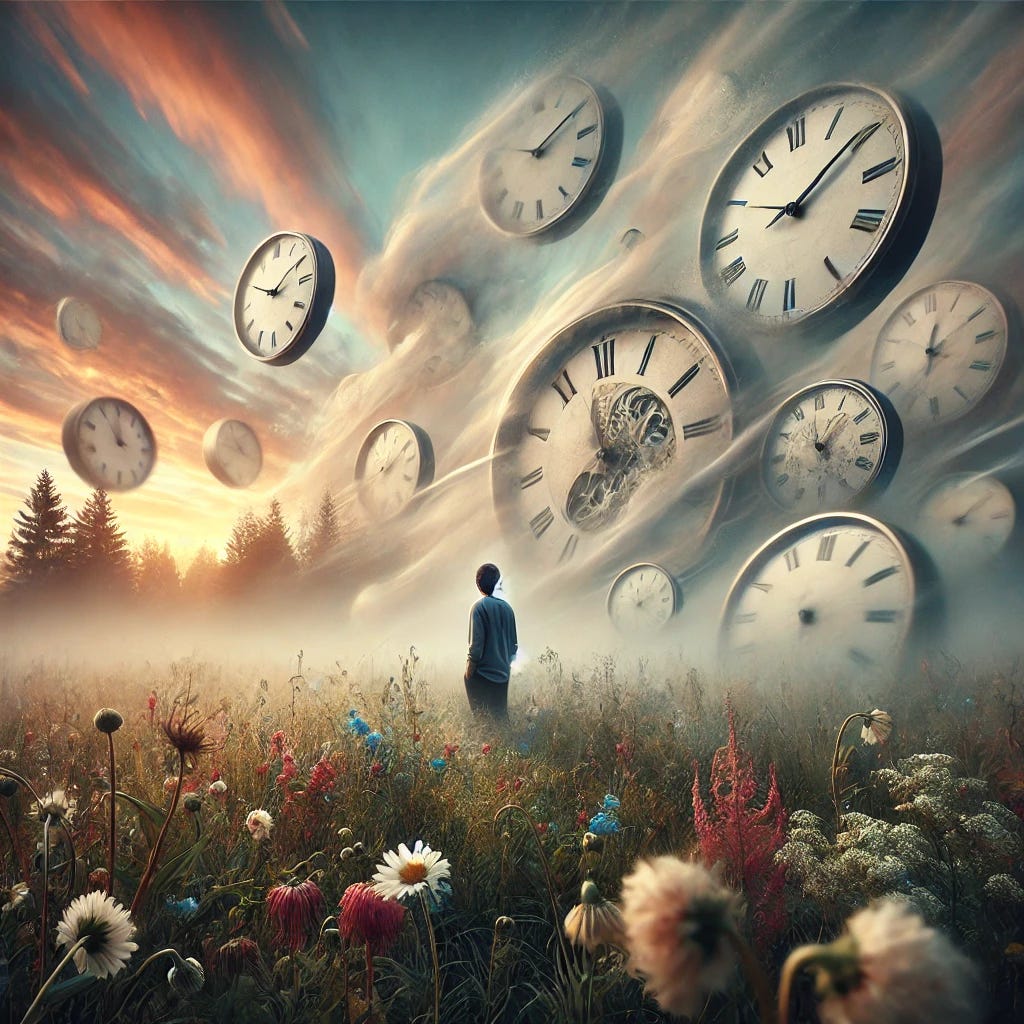How to Slow Down Time
I remember the shock of noticing that I could remember events from 25 years prior. I was at my desk, supposed to be working, but I found myself reading Philip Larkin’ Send No Money instead. Larkin’s words hit hard. Time had led him “to the centre of a maze,” where he could finally “see the whole of the moon, all day long.” For the first time, perhaps somewhat later than most, I understood the power of self reflection.
Yet now, in the blink of an eye, I can remember things from 50 years ago. I’m back in the early 1970s, hanging my pump bag on a cloakroom peg at Franche First School in Kidderminster. I’ve already worked in two general elections for Harold Wilson, watched a moon landing on a rented television, had a childhood crush on Elizabeth Taylor as Cleopatra, and experienced the thrill of a five-geared Raleigh Chopper gleaming in the kitchen on Christmas Day.
We carry memories like overstuffed suitcases packed with possessions we can never let go. At seven, though, there’s hardly any “time past” to weigh you down, as T.S. Eliot suggests in Burnt Norton:
“Time present and time past
Are both perhaps present in time future,
And time future contained in time past.”
Four kids though, each minute unfolds like a fresh page, every day a new discovery. At 7, I hadn’t yet made it through the Narnia series and didn’t know who Spike Milligan was. But I knew who President Gerald Ford was because I was a bit weird even then.
At that age, every detail was new, every encounter a revelation, and each day was distinct from the last. But as routines settled in and the past began to accumulate, that lightness faded, and the years started to blur together.
So, at 57 years old, I’ve set myself a new goal, and it’s a big one: from here on in, I’m going to slow down time. I need to add novelty into my days to counteract the routine-induced acceleration that makes the years disappear. It doesn’t have to be grand; it just has to be different.
This means stepping off my well-worn paths, looking out the window more often on train journeys, walking down unfamiliar streets, cooking new recipes and just trying something new every day. By embracing small shifts in habit and scenery, I hope to keep the days feeling distinct. No day should slip by unnoticed.
I’m also planning a few more new experiences for 2025, starting with my garden, where time naturally slows down because no day is the same when you’re growing things. I watched a snail munch its way through a fading Hosta this week. Most would have dealt with it, but I thought the hosta was fading away anyway and the snail need sustenance. I admit I’m less patient with the squirrels digging up my newly planted crocus bulbs, but that’s also part of the garden’s unpredictability.
Also at 57, I find I can find a Larkin quote for every occasion. Here’s The Mower:
The first day after a death,
the new absence
Is always the same; we should be careful
Of each other, we should be kind
While there is still time.
Makes you think doesn’t it? Time is the rarest commodity of all.
Four Scientific Explanations for Why You Can Slow Down Time
Psychologists and neuroscientists have uncovered why the years slip by and how we can counteract it. Here are four scientific explanations showing why we can slow down our perception of time with intentional effort.
The “Novelty Hypothesis” – David Eagleman: Neuroscientist David Eagleman explains that the brain focuses on new experiences encoded as dense, rich memories. In childhood, everything is novel, making time feel expansive. As we age and settle into routines, fewer events stand out, causing the years to blur together. This is why vacations seem to last longer—they’re packed with novelty. Adding new activities and breaking routines can restore a bit of this “slow-motion” effect.
Eagleman, D. (2009). Time and the Brain.
The “Oddball Effect” – Marc Wittmann: Psychologist Marc Wittmann describes the “oddball effect,” where unexpected events last longer because the brain devotes more attention to them. When we encounter something surprising, our perception of time stretches, making these moments feel fuller in memory. Even small changes, like taking a different route or trying new food, activate this effect, adding depth to our days.
Wittmann, M. (2016). Felt Time: The Science of How We Experience Time. MIT Press.
Attention and Mindfulness – Ellen Langer: Psychologist Ellen Langer’s research shows that focusing on the present can slow down time. When we pay close attention to details, like noticing flowers in bloom or enjoying the sights on a walk, we break free from “autopilot” mode, which shortens time. This mindfulness practice can make life feel richer and prevent the days from slipping by.
Langer, E. (1989). Mindfulness. Addison-Wesley.
The “Proportional Theory” of Time Perception – Pierre Janet: Pierre Janet’s theory of proportional time perception suggests that each year feels shorter because it represents a smaller fraction of our total life. For a child, a year is long; for an adult, it’s comparatively brief. There’s not much we can do about this, but the idea implies that, as we age, we must seek variety to counteract the proportional “compression” of time.
Janet, P. (1930). L'évolution de la mémoire et la notion du temps.
Listening
Is it really nearly 45 years since I first fell in love with The Cure? I remember slipping that cassette into my Sony Walkman and hearing Boys Don’t Cry for the first time. Last night, I lay in bed watching them perform tracks from their new album, Songs of a Lost World, live on YouTube, this time on my iPhone. That’s the passage of time for you.
Reading
France on Trial by Julian Jackson is a meticulously researched account of Marshal Pétain's post-war trial, showing how France reckoned with the moral compromises of the Vichy regime. Jackson captures the drama and complexity of Pétain's downfall, from a celebrated World War I hero to a man condemned for collaborating with Nazi Germany. Sentenced to death in 1945, though spared by De Gaulle due to his age, Pétain spent his final years in prison, a stark end for the “saviour” who saved the wrong people. You’re only as good as you last save!





Love The Cure but watching them makes me feel old. How much we’ve all aged since then. Staying curious to new music, new experiences, new perspectives is a good way to ‘stay young’. At the age of 60 with a 13 year old that certainly keeps me young. Seeing the world through her eyes is always a wonder!
I'm the same age as you an over the past year or so, it's become more apparent to me that I'm in the last half of my life. I can relate to the novelty hypothesis as trying new things seems to keep me younger. Have recently been reading about stoicism and their philosophy seems to add a bit of perspective to things.